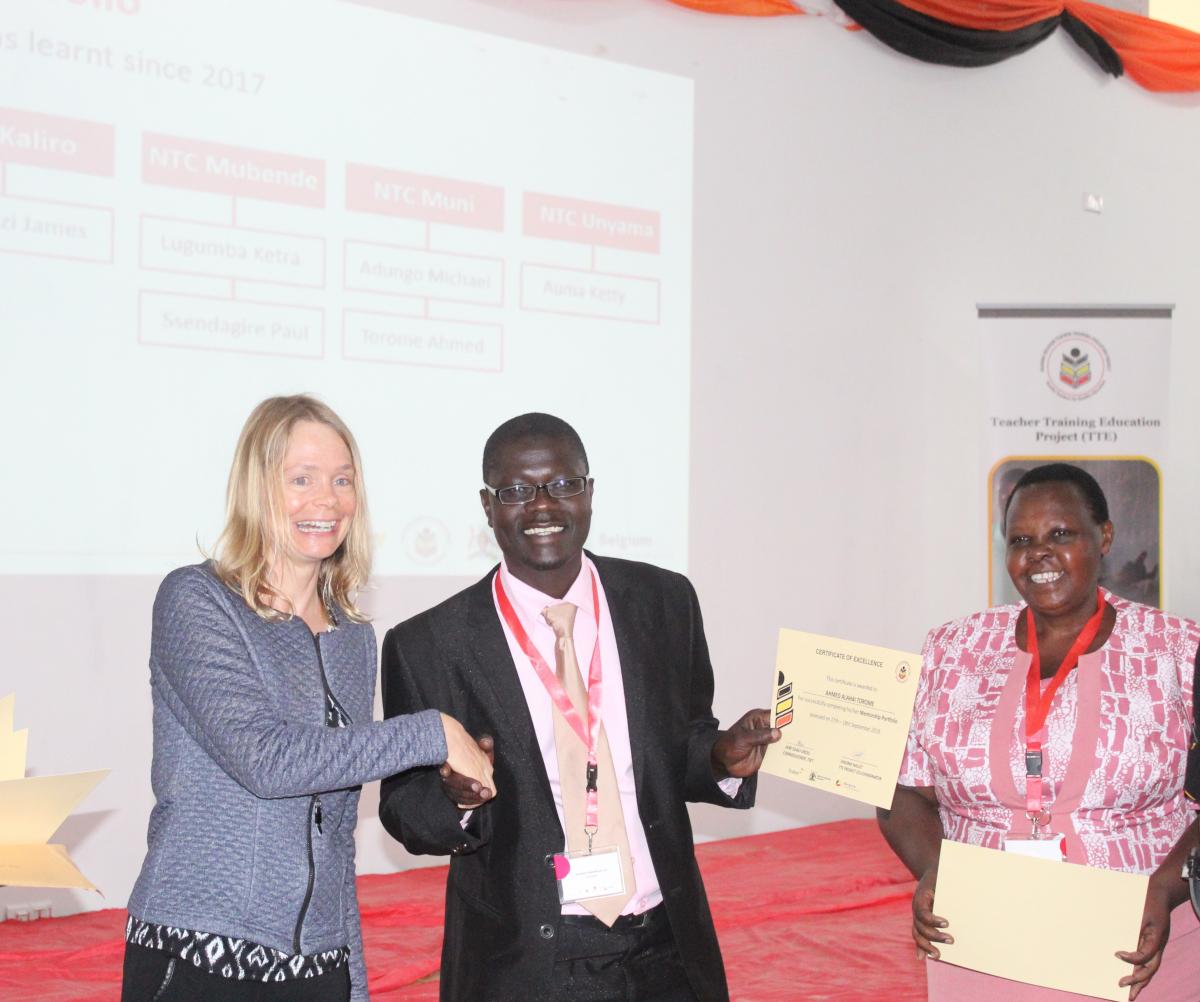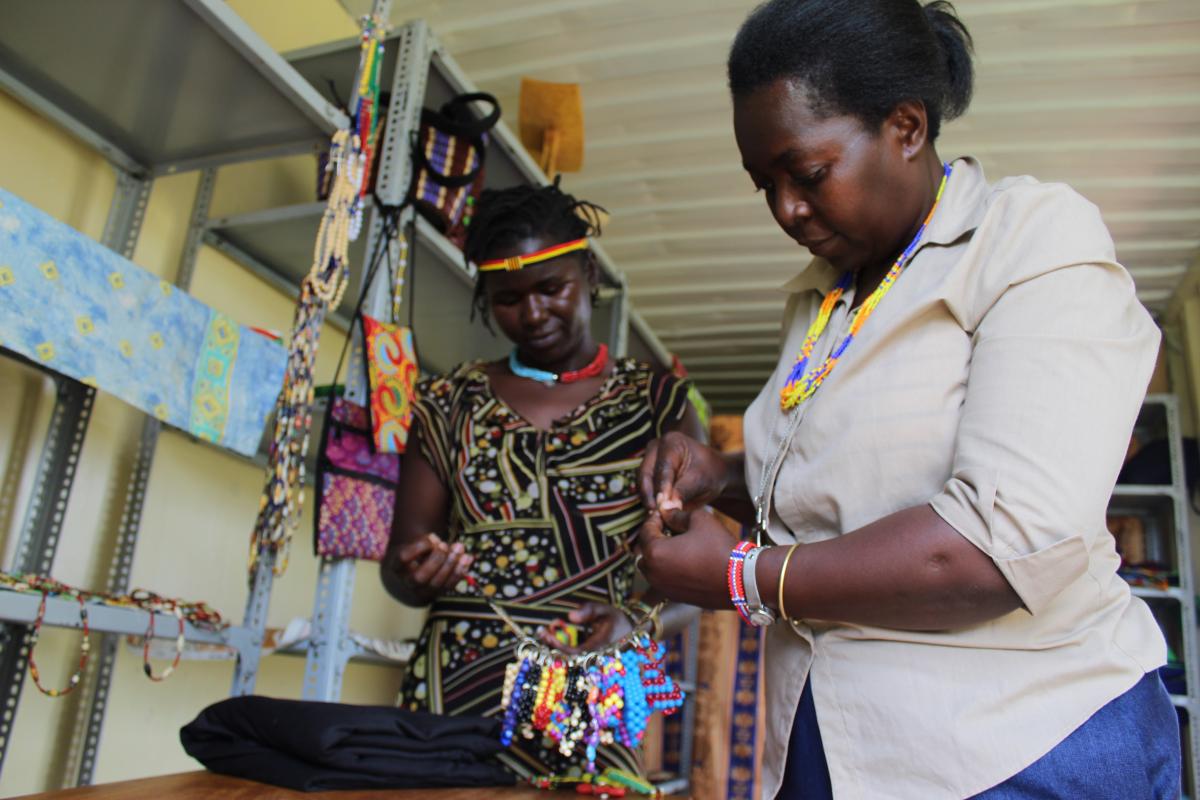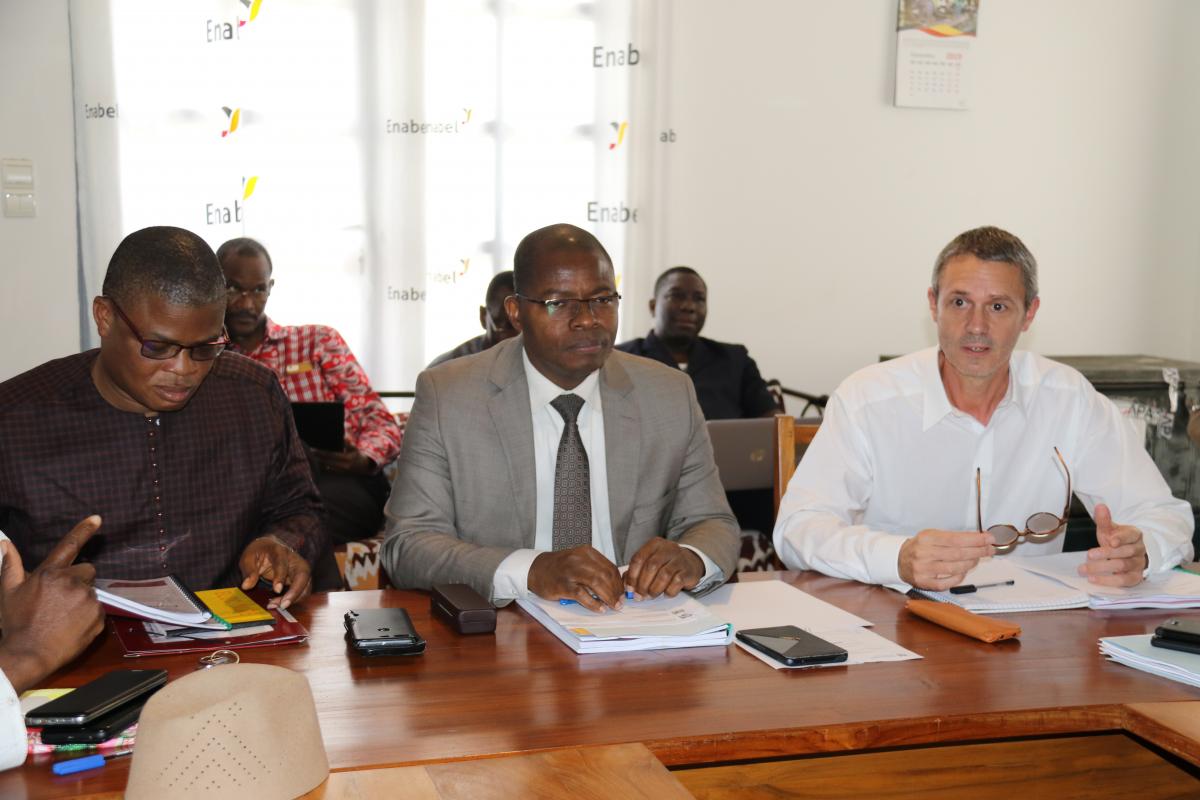Search
Viewing 1665 to 1680 of 2520 news
-

How to get the VET Toolbox support? Watch our animation!
Thibaut MONNIER | 04/11/2019
More information on www.vettoolbox.eu
-
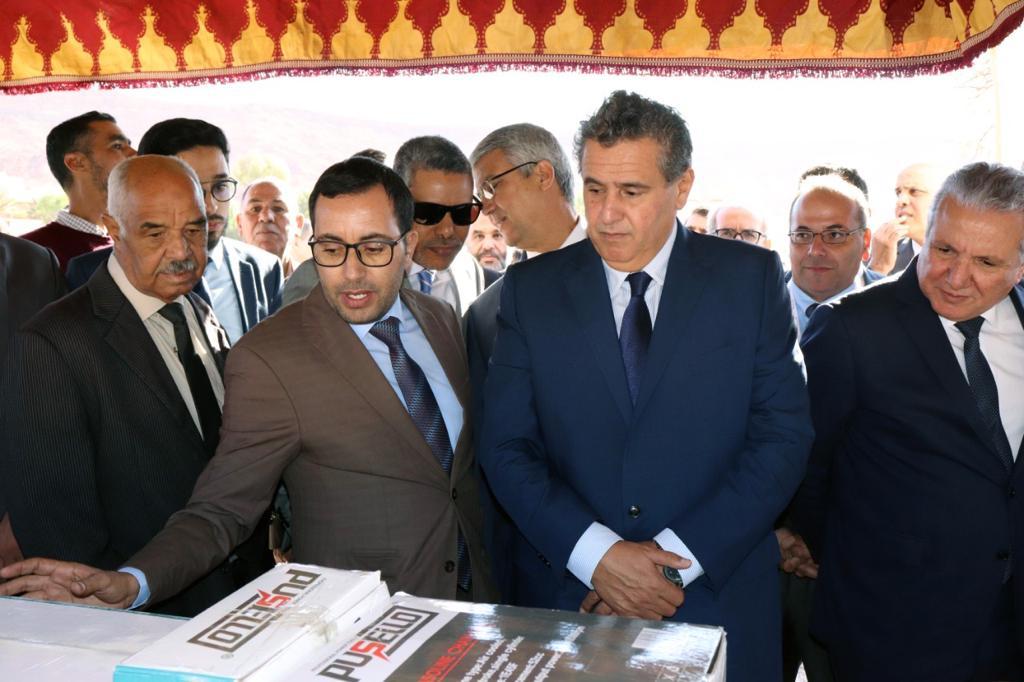
L’entrepreneurial rural au service du palmier dattier
Meriem HILALI | 02/11/2019
En marge du Salon International des Dattes au Maroc, a eu lieu une cérémonie de distribution d’équipements au profit des coopératives de service par Monsieur le Ministre de l’Agriculture, de la Pêche maritime, du Développement rural et des Eaux et Forêts.Cette intervention, financée dans le cadre de la coopération Maroc-Belgique, s’inscrit dans le projet d’appui aux groupements d’intérêt économique pour le développement de la filière phoenicicole au niveau des oasis marocaines (PAGIE).
-
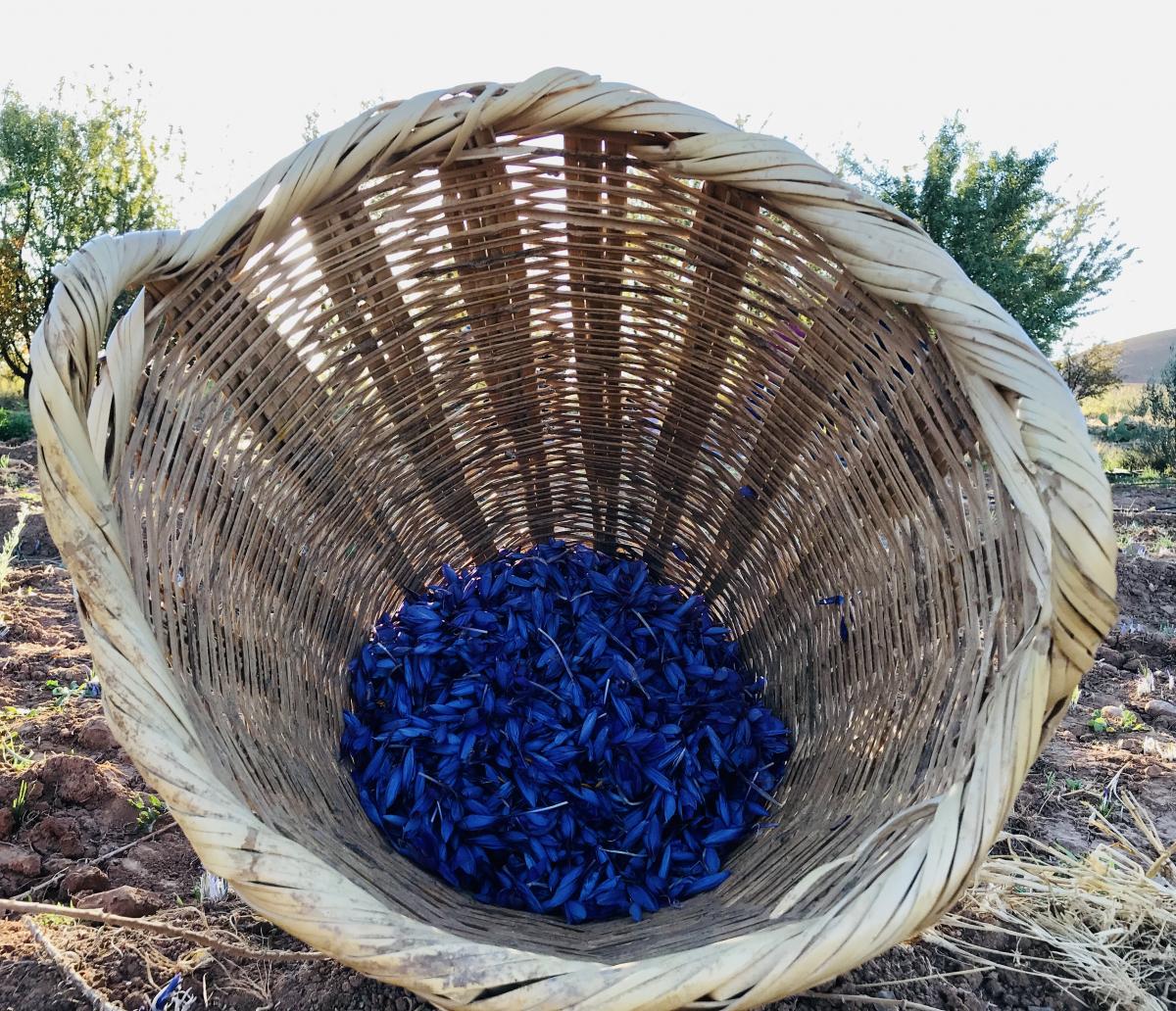
L’or rouge à l’honneur
Meriem HILALI | 02/11/2019
Lors de l’inauguration de la 13éme édition du Festival International du Safran, le projet d’Appui aux filières du safran et du palmier dattier a exposé ses réalisations à monsieur le secrétaire général de la province de Taroudant. De 2013 à nos jour et en partenariat avec l’Office Régional de mise en valeur agricole de Ouarzazate, L’office national du conseil agricole, l’Agence de développement agricole et l’inter-profession, l’intervention a réalisé plusieurs activités (Forage, goûté à goûte, pompage solaire, laboratoire du safran, alphabétisions...) au niveau des deux filières et a pu atteindre la majorité de ses objectifs.
-

3e EDITION DU SALON DES METIERS ET DE LA FORMATION (SMF)
Grâce MALI FAIDA | 01/11/2019
La 3e Edition du Salon des Métiers et de la Formation a eu lieu du 24 au 26 Octobre 2019 au bâtiment Hypnose Mall à Lubumbashi. Durant cette semaine a eu lieu la compétition des métiers soutenue par le projet EDUKAT. Cent cinquante participants venus de 6 Provinces ont compéti pour 19 filières retenues. Issu d’un partenariat fort lié entre la FEC et le Centre de Ressources du Haut-Katanga (CdR), cette semaine des métiers est l’occasion de redonner aux métiers techniques et professionnels leurs lettres de noblesse. Le but ultime poursuivi est d’assurer l’adéquation entre la formation et l’emploi, principe fondateur de la mise en œuvre de la convention de partenariat Public-Privé, tel que l’a rappelé Madame Murielle Hermouet, Responsable du Portefeuille Pays, lors de son mot d’ouverture. La compétition des métiers a bénéficié du soutien de WorldSkills Belgium, l’association belge de promotion des métiers techniques et manuels, qui a préparé les compétiteurs au travers de coaching adaptés. Cinquante-sept (57) médailles ont été décernées lors de la finale. Ce grand rendez-vous des métiers a reçu la visite de plus de 2.500 visiteurs qui ont pris connaissance des 37 stands d’exposition des différentes institutions, écoles et entreprises partenaires présentes pour l’occasion ainsi que des conférences qui y ont été organisées.
-
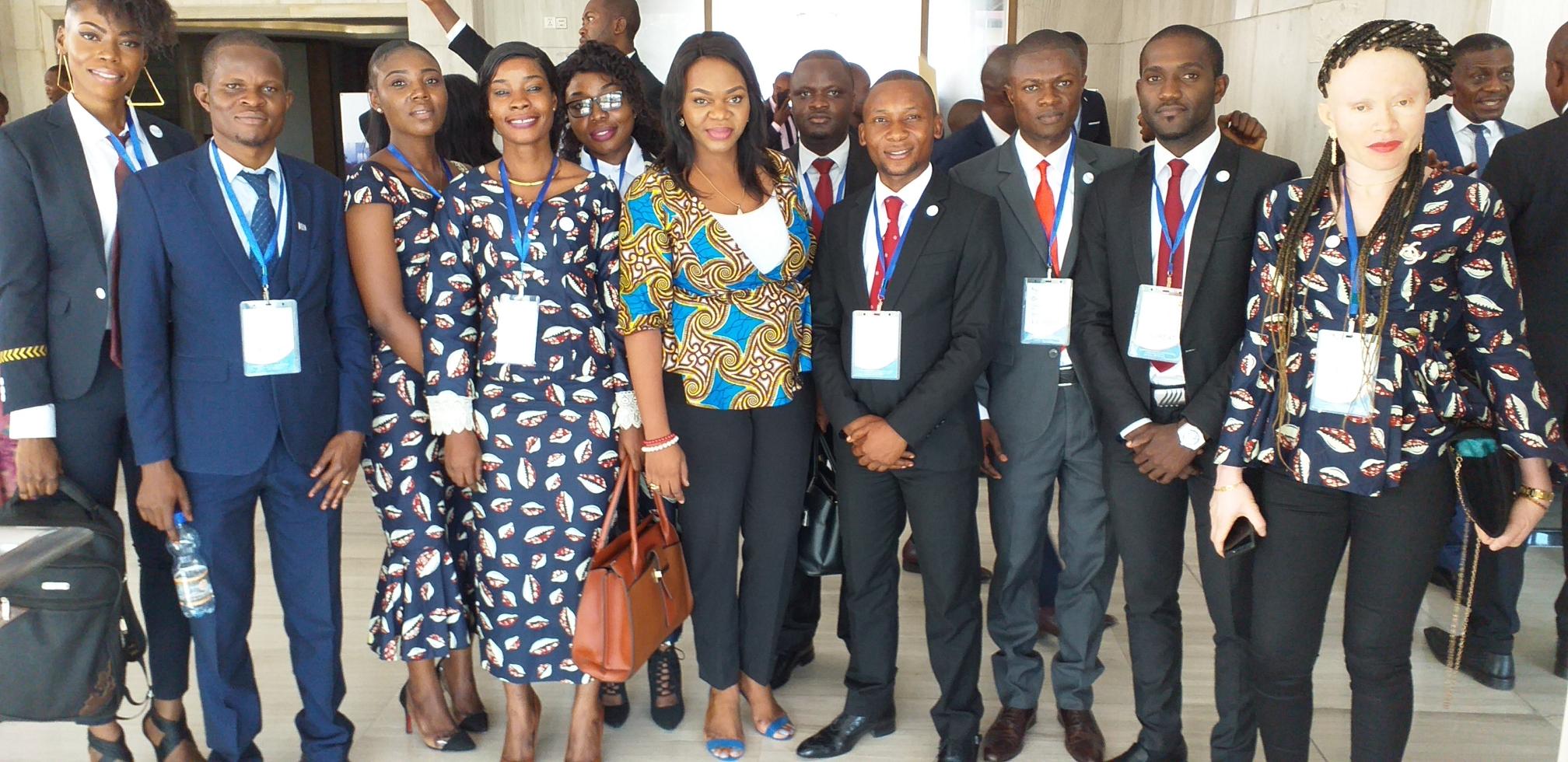
REMISE DE DIPLOMES AUX ENARQUES PROMOTION FLEUVE CONGO
Grâce MALI FAIDA | 31/10/2019
Les lauréats de l'Ecole Nationale d’Administration (ENA), promotion Fleuve-Congo, ont fièrement reçu aujourd'hui leur diplômes de fin de cycle des mains du Ministre d'Etat chargé de la décentralisation et de la réforme institutionnelle, SEM Azarias Ruberwa. Le projet PRECOB a contribué à la formation globale de cette promotion : Onze (11) lauréats ont passés 3 mois de stage au sein des différents projets d'Enabel en RDC tant à Kinshasa qu'en provinces, et dix (10) autres ont reçus une bourse afin de parfaire leur formation en Belgique grâce au partenariat avec l'Institut Egmont. 99 Lauréats de l'ENA sont donc formés et prêts à intégrer l'administration publique congolaise et à contribuer au processus tant prôné de son rajeunissement. Toutes nos félicitations aux lauréats. Nous avons hâte de les revoir à l'oeuvre au sein des différentes administrations tant centrales que provinciales.
-
Supporting the Teaching Profession in the National Teachers' Colleges
Dorothy KYAMAZIMA | 30/10/2019
“While we are always quick to recognise education as the driving force for development in any country, we need to ask ourselves in our different capacities, (as ministers, as technical officers, as leaders, parents and students) an important question. Is education possible without teachers?” Rudi Veestraeten, Belgium Ambassador to Uganda.Simply put, teachers are the most important agents of change in the education process. Their role is one that cannot be over-emphasized because it stretches beyond their obligation and responsibility to pass on information to one that directly or indirectly influences the lives of students. Whether this in a classroom during the early stages of education or in a lecture hall at tertiary institutions, their role is central to the education process. Therefore, for students to learn and obtain the best education they need more than just books and resources, they need qualified teachers. It is with this in mind, that Enabel in partnership with the Ministry of Education and Sports set out to improve the quality of education in Uganda, with a focus on teachers through the Teacher Training Education (TTE) project. This project majorly focuses on improving secondary teacher education in the National Teachers’ Colleges (NTCs) of Mubende, Muni, Kabale, Kaliro and Unyama.Improving the ProfessionIn the days leading up to the National teacher day celebrations, the Teacher Training Education project organised a separate event on 2nd October hosted by NTC Kabale. This event brought together a diverse group of stakeholders from the Ministries, Uganda National Teachers’ Union (UNATU), Teacher colleges and education development partners to honour the contribution of teachers from the National Teachers’ Colleges to the education process. Under the global theme ‘Young teachers: The Future of the Profession’, the event tackled several objectives namely: presenting the impact of the National Teacher Policy on secondary teacher education, showcasing new in innovations that can improve teacher education, advocating for the needs of the NTCs and recognizing and honouring outstanding NTC staff. While the act of teaching may be considered as a highly rewarding process, the teaching profession is not without its challenges. During his speech, H.E Rudi Veestraeten, the Ambassador of Belgium highlighted several challenges affecting teachers in Uganda today. Among these was the low salaries, limited scope for career development and poor infrastructure. He, however, called upon all stakeholders to make more efforts to retain the young talents and brightest minds within the profession. In an attempt to address the needs and challenges that teachers face today, two advocacy points were raised during the teacher’s day celebration. One was the need to shift the focus from theory to practice. Dubbed as “Practice Makes Perfect”, the project showcased an innovation called the Continuous School Practise (CSP) Pilot system that is currently running in the five National Teachers’ Colleges. This pilot system provides young pre-service teachers with the opportunity to acquire hands-on teaching skills and practice new learner-centred teaching methodologies in an actual classroom. Among the other innovations in this area, is the online education platform on revised and modernized general teaching methods course that is currently under development. This online course provides easy and free learning resources to NTC in-service teachers ‘anytime and anywhere’, an aspect that can greatly improve access to education. The second advocacy point raised, focussed on closing staff gaps in the NTCs. This stemmed from the human resource challenges that the current establishment could not fulfil. The existing structure of the NTCs operates with staff gaps such as ICT managers, procurement officers, laboratory technicians among others, which limit the operational capacity of the colleges. Addressing these issues provided a grand opportunity for stakeholders to support teachers in the NTCs to deliver to the best of their ability and prepare them to teach in the 21st century. Kyambogo University the examination body of the NTCs committed to reviewing the college curriculum to include Continuous School Practices (CSP), Active Teaching and Learning (ATL) methodologies, ICT and gender-responsive pedagogy. The Ministry of Education and Sports committed to providing demonstration schools attached to the NTCs for better teaching practice, recognising the use of mentors to strengthen pedagogical support and allocating a budget for CSP. The Ministry of Public Service, on the other hand, committed to fulfilling all the positions in the NTC establishment with a gender-based approach. This event also saw both the teaching and non-teaching staff awarded for their outstanding performance and service in the institutions. The Teacher Training Education (TTE) Project places massive focus on three key areas of Institutional development, Infrastructure and Pedagogy, which when combined contribute to improving the quality of education in the National Teachers’ Colleges.
-
SISTER MARY CROSSED THE BORDER TO SKILL VULNERABLE KARAMAJONGS.
Joseph BASOGA | 28/10/2019
She accepted to travel a long journey across the border to serve a vulnerable community that was construed to be hostile. Sister Mary, like she is popularly known is a mother to many motherless Karamojong children, majority of whom are either infected or affected by the HIV Scourge. She sits in the yellow container every day, patiently teaching young girls and boys, how to make beads and other handcrafts for sale. “Ihave trained over 200 clients, some have been able to live positively for 18 years and I’m proud to say they can now use handcrafts to earn a living” she says. The programme code named Choose Life Home based care was introduced to support infected and affected HIV/AIDS. Mary conducts a holiday programme with orphaned children that participate in games and positive story telling. When games are over she then conducts counselling sessions on HIV/AIDS and home-based care.The sister also receives some support from Enabel through the skills support programme at St. Daniels Comboni. The institution has offered space to the “choose life programme”. This is part of the cross cutting services that are offered to the Karamoja community to enable vulnerable Karamajongs gain skills for development. The presenting challenges on the programme include the gap in feeding and limited market for the product that they make. They mainly rely on sales from the Karamoja Tourism market which is seasonal.In future sister Mary plans to introduced a numeracy, language and business skills training component to empower craft trainees gain skills in marketing and business management
-
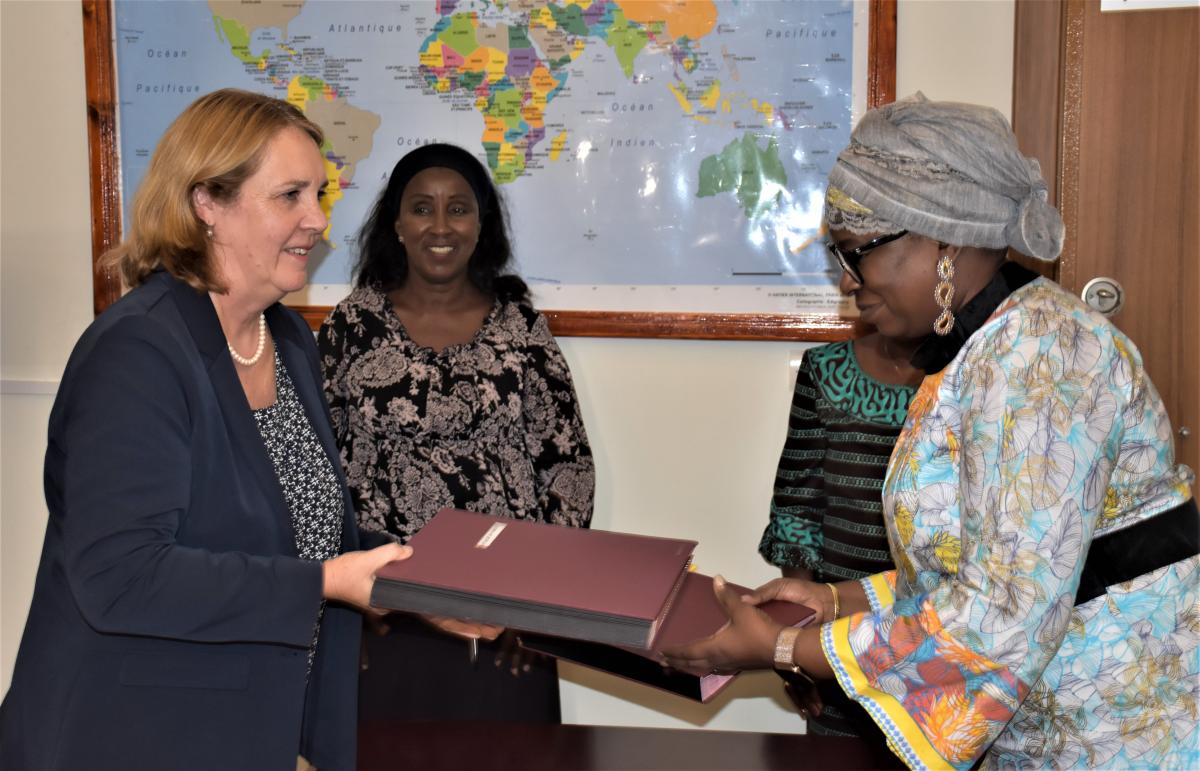
Signature de la lettre d’entente Enabel en Guinée - Ministère de la coopération
Djene Deen KOUYATE | 22/10/2019
Enabel a procédé ce lundi 22 octobre 2019 à la signature, de la lettre d’entente pour la gouvernance opérationnelle des interventions du programme de coopération Guinée-Belgique (2019 - 2023). La convention spécifique du dit programme était signé entre le gouvernement du Royaume de Belgique et le gouvernement de la République de Guinée le 14 décembre 2018 à Bruxelles. Le Ministère de la Coopération et de l’Intégration Africaine est délégué pour le suivi de l’éxécution qui sera effectuée par l’Agence Belge de Developpement Enabel . Il est prévu la mise en œuvre de 5 interventions (réparties en 3 piliers) sur l’axe Conakry – Kindia – Mamou : le premier pilier s’applique à la promotion de l’ Entrepreneuriat ( appui au développement de entrepreneuriat féminin , agricole , et urbain ) , le second dénommé Elle décide porte sur la promotion des droits sexuels et reproductifs , et le dernier pilier est accès sur la formation , les études et expertises . Le but du partenariat est l’atteinte des objectifs du 1er programme de coopération bilatérale Guinée-Belgique doté d’un budget de 45 Millions EUROS pour la période 2019-2023 . Ce programme intègre la vision de développement socio-économique du gouvernement guinéen et les priorités de la politique étrangère et de la coopération au développement belge.Mme Keita Djène Ministre de la coopération et de l’intégration africaine, a remercié la Belgique pour le dynamisme de la coopération entre les deux pays et pour le travail de qualité déjà réalisé par l’Agence belge de développement au cours du programme de démarrage sur la période 2016-2018 et pour un montant de 15 millions d’euros. . Mme Krista Verstraelen Représentante Résidente , a réaffirmé quant à elle l’engagement de l’Agence belge de développement dans la mise en œuvre du programme qui est un défi immense et bénéfique pour les deux pays.
-
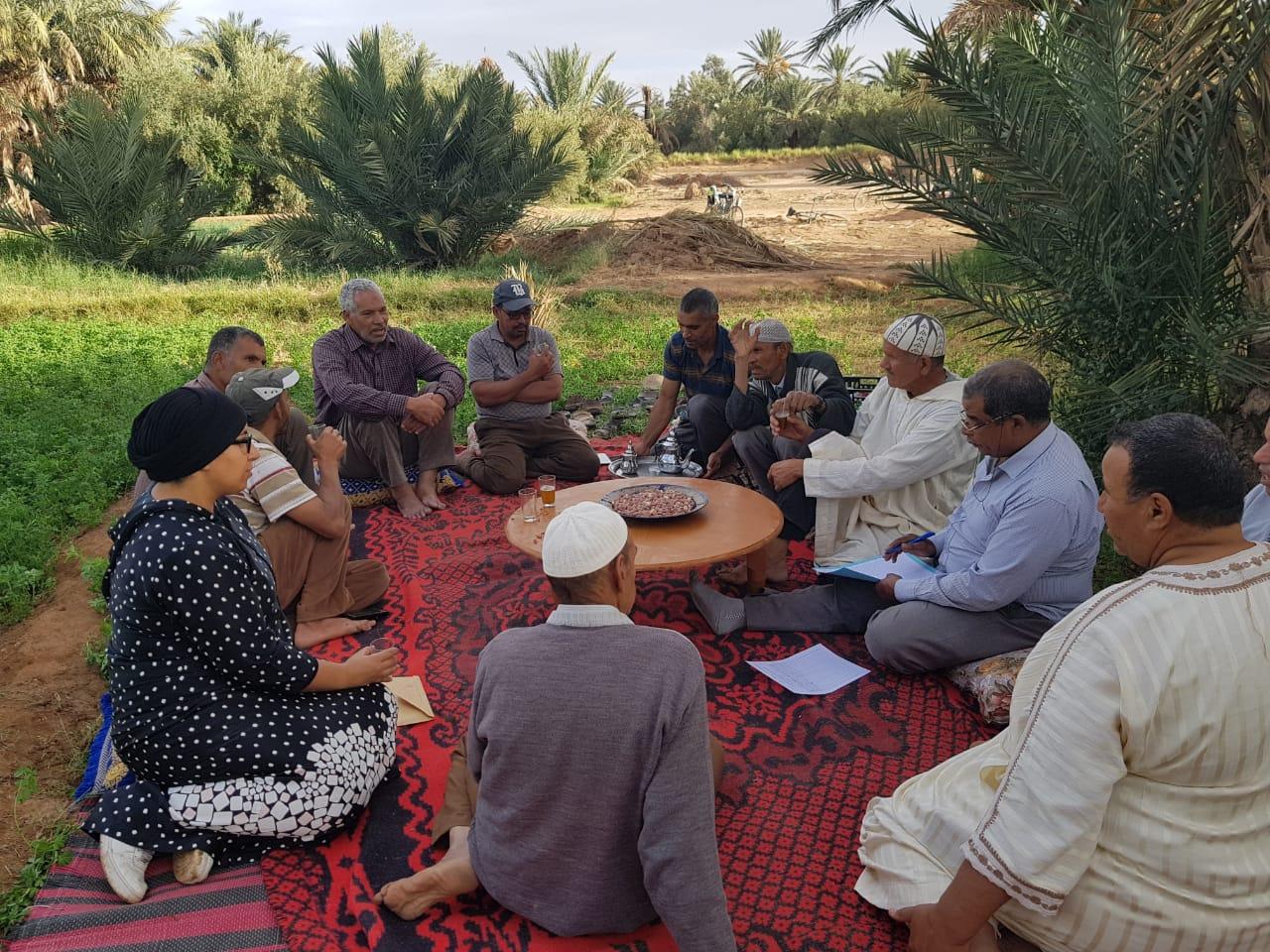
Pour une qualité concurrentielles
Meriem HILALI | 14/10/2019
Le projet d’Appui aux Groupements d’Intérêts Economiques de la filière phoenicicole au niveau des oasis marocaines PAGIE mène depuis 2 semaines à Hannabou dans les environs d’Erfoud des ateliers de renforcement des capacités sur les techniques de récolte des dattes. Cela permettra aux 26 agriculteurs des coopératives d’avoir des dattes propres et de qualité, plus concurrentielles sur le marché.
-
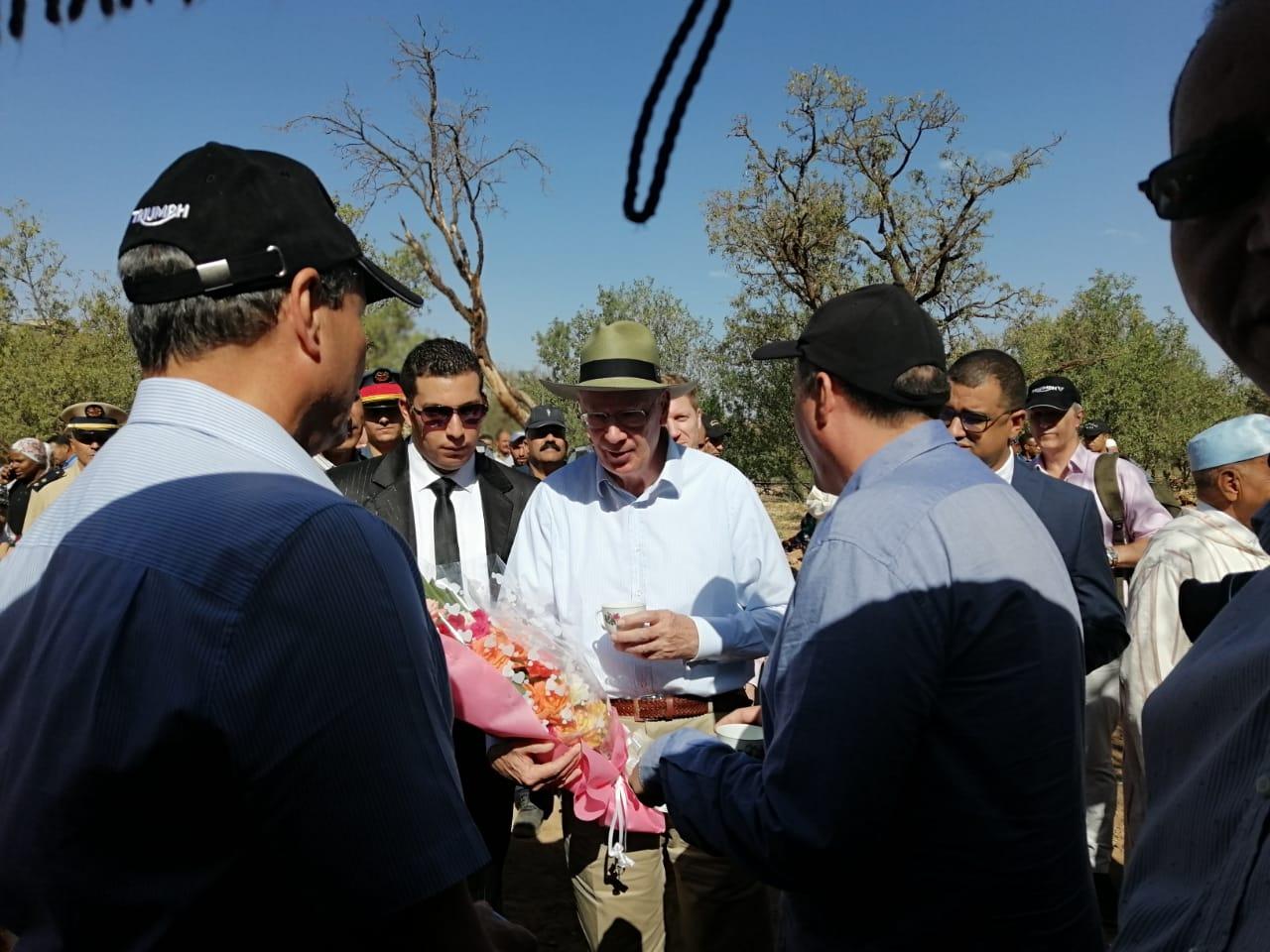
Visite princière
Meriem HILALI | 14/10/2019
En l’honneur du Prince Richard, Duc de Gloucester et membre de la maison royale britannique lors de son passage dans la province de Ouarzazate, une exposition de produits de terroir dont le safran des coopératives Tifaouete et Zaafaran darnet bénéficiaires du projet Maroco-Belge du Projet de Développement des filières du Safran et du Palmier-Dattier dans les régions Souss-Massa et Drâa-Tafilalet #Safran&Dattes a eu lieu le mercredi 9 octobre 2019 dernier au centre Sidi Hssein à ifri.
-
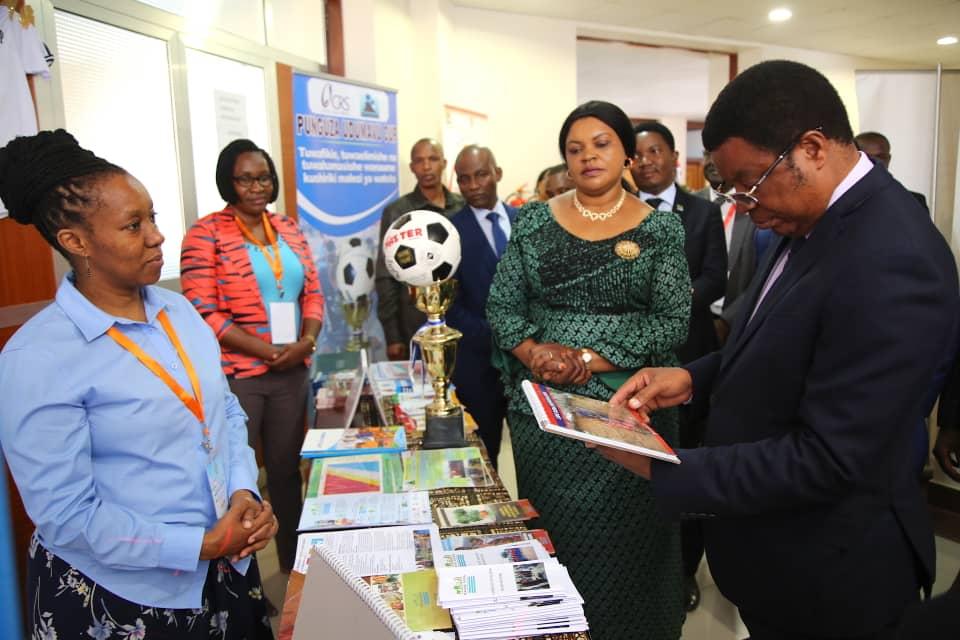
Focus on nutrition: showcasing Maisha Bora activities to the Prime Minister of Tanzania
Mathias LARDINOIS | 10/10/2019
Childreach / WFP presented Maisha Bora programme with a stand and documentation at the Joint Multisectoral Nutrition review meeting held in Dodoma Oct 3-4.That meeting was officiated by the Prime Minister of Tanzania Hon. Kassim Majaliwa, who was very interested with our programme.
-

Focus on coordination: Video
Mathias LARDINOIS | 09/10/2019
This video shows you more about what is the coordination component in the field.
-
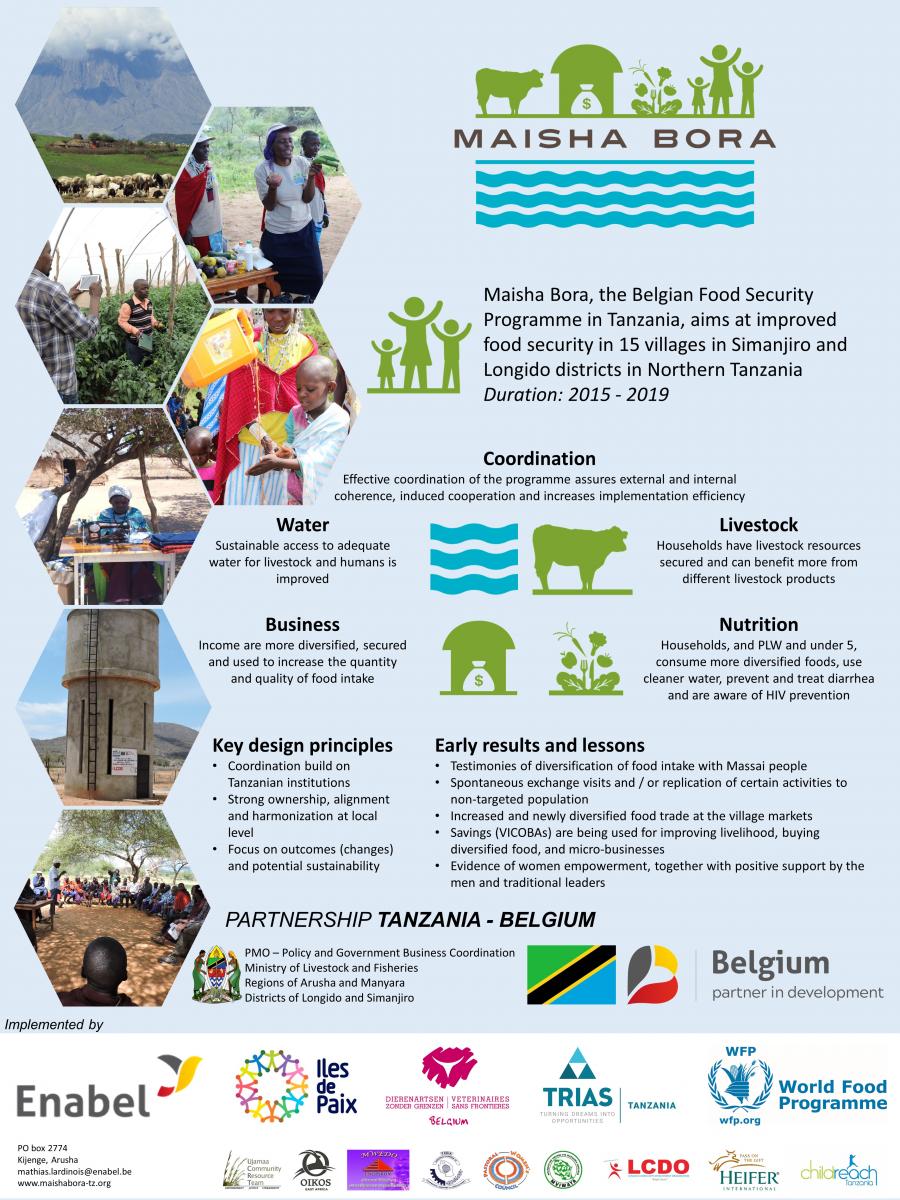
6th Joint Multisectoral Nutrition Review meeting (Poster)
Mathias LARDINOIS | 07/10/2019
The poster we presented at the 6th Joint Multisectoral Nutrition Review meeting
-
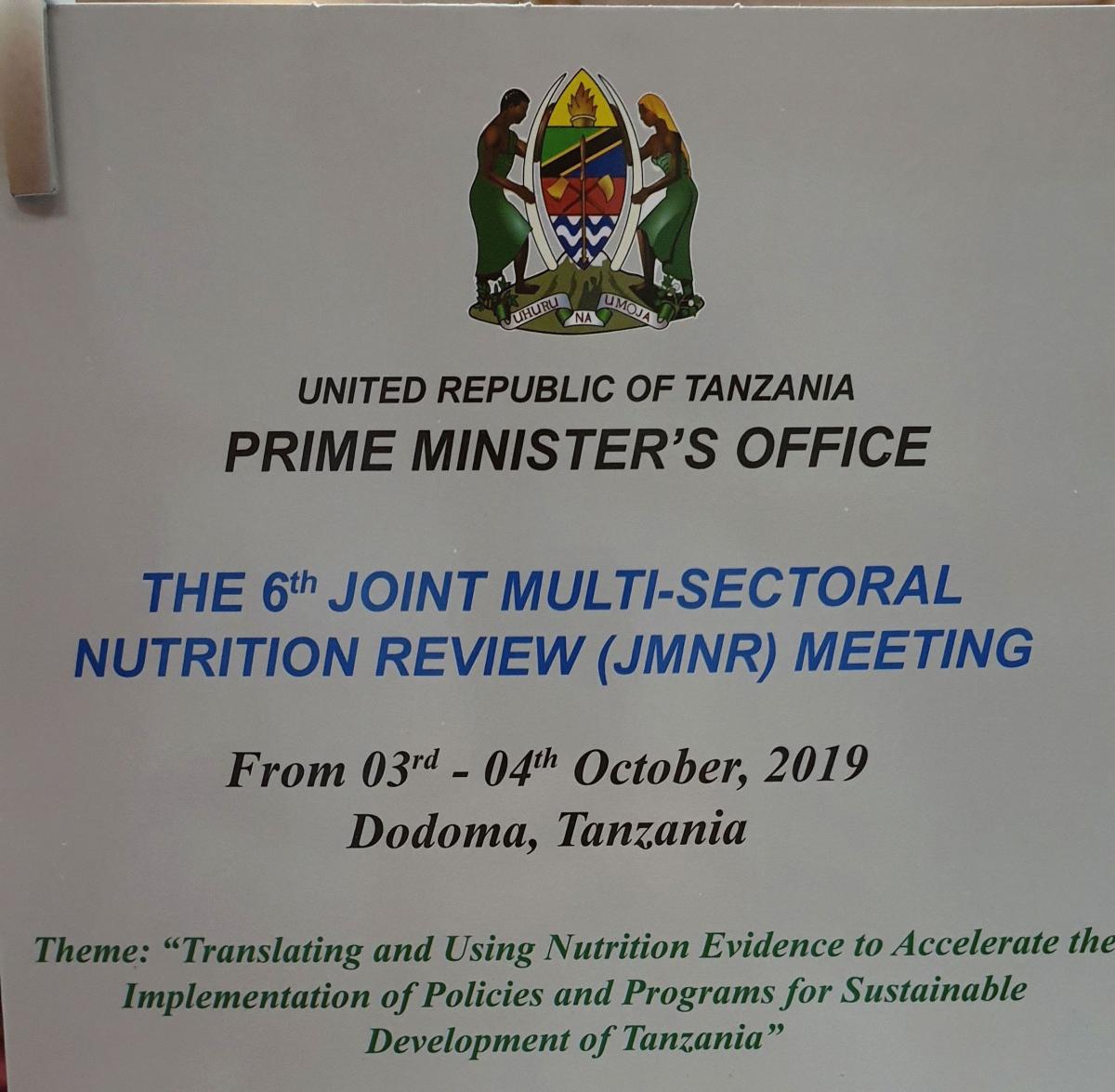
6th Joint Multisectoral Nutrition Review meeting
Mathias LARDINOIS | 07/10/2019
With a delegation from Enabel, WFP and Childreach, Maisha Bora attended the 6th Joint Multisectoral Nutrition Review meeting in Dodoma officiated by Prime Minister of Tanzania Hon. Kassim Majaliwa. It was the occasion to take stock of the National Multisectoral Nutrition Action Plan and to share our experience from the field. It is reassuring to see that Maisha Bora is already implementing most of the recommendations from the mid-term review of the plan. A good indication that our programme approach makes a lot of sense. With the collection of final quantitative and qualitative indicators currently in progress, by the end of this year we will be able to start sharing our results and lessons, and propose good practices with stakeholders, from the village to the national levels.Stay tuned for more info in the coming months!
-
Le Volet institutionnel du PROFI Clôturé Les fondements de l’institution publique clarifiés et repositionnés
Reece-hermine ADANWENON | 30/09/2019
Initié par l’Agence belge de développement « Enabel » au Bénin pour améliorer l’environnement institutionnel en faveur de la promotion des filières agricoles, le volet institutionnel du Programme d’appui au développement des filières agricoles (PROFI-VI) s’achève sur une note de satisfaction. Au cours de la dernière session de la Structure Mixte de Concertation Locale (SMCL), qui s’est tenue le jeudi 26 septembre 2019, dans la salle de réunion de la Représentation de Enabel au Bénin, le rapport final du rapport de l’évaluation finale du programme dans son volet institutionnel a été présenté aux membres. Il ressort des conclusions dudit rapport que le PROFI VI a, entre autres résultats, accompagné les départements et services (centraux et déconcentrés) dans la mise en œuvre des fonctions qui leur sont dévolues.Conduite par Jean Sébastien CANALS, Ingénieur agro-économiste, Chef de mission, Paul Onibon, Ingénieur agronome du Cabinet Analysis for Economic Decisions - ADE s.a., la mission d’évaluation du Programme PROFI volet institutionnel a fait observer que la stratégie développée par le PROFI-VI et Enabel en concertation avec les autorités locales a été particulièrement pertinente, mise en œuvre avec efficacité et efficience et les résultats et impacts sont connus et reconnus à de nombreux niveaux. Il ressort également de l’analyse du programme au regard des 5 critères CAD (Coopération Au Développement) à savoir : la pertinence ; l’efficacité, l’efficience, l’impact et la durabilité (viabilité) que la grande majorité des résultats ont été atteints et ont concouru à l’objectif global du projet. Selon les évaluateurs, le PROFI VI est un programme qui a contribué à : clarifier et repositionner les fondements d’une institution publique, accompagner les départements et services (centraux et déconcentrés) dans la miseen œuvre des missions qui leur sont dévolues, définir les profils de postes des principaux cadres, proposer/former/accompagner la mise en place de nouvelles méthodes, outils deprogrammation/planification/budgétisation/suivi permettant ainsi à la structure d’être plusperformante, de mieux comprendre et mettre en œuvre les réformes et nouveaux paradigmes avec pour objectif le développement et le renforcement des filières comme pilier de la nouvelle politique agricole. Par ailleurs, la mission a recommandé au Ministère de l’Agriculture de l’Elevage et de la Pêche (MAEP) : - d’apporter une attention toute particulière à la coordination entre les niveaux et lesacteurs d‘autant que le niveau central est depuis peu appuyé par un bureau d‘études européen qui a gagné l’appel d’offre lancé par l’UE et le niveau déconcentré par une coopération déléguée bilatérale (Enabel) ; - d’utiliser à bon escient les méthodes et outils qui ont été produits par le PROFI-VI et éviter de recréer de nouveaux outils qui viendraient engendrer de la confusion.- concernant les PSNF, de prévoir leur formation et recyclage sur les méthodes etOutils définis par le niveau central (MAEP) p.e. le Conseil Agricole. À Enabel et ses projets/programmes du secteur agricole, la mission recommande de : - Tenir compte dans leurs interventions des équilibres à respecter entre appuis aux filières d‘export et Sécurité Alimentaire & Nutritionnelle ;- Clarifier les périmètres d’intervention du projet ARISA-B et renforcer les maillons faibles du dispositif sur les outils non encore appropriés et maitrisés. Il a été fait remarqué avec un point d’attention spécifique, que les femmes sont trop peu présentes dans toutes les institutions publiques ou Agence Nationales Etatiques notamment au niveau méso et macro. Les évaluateurs recommandent à ce propos la mise en place d’une vraie politique en la matière. Comme résultats obtenus, le rapport a fait observer que le PROFI-VI s’est engagé au côté du MAEP et de ses services techniques centraux dont la Direction de la Prospective et de la Programmation (DPP), pour l’atteinte des principaux résultats que sont :• Renforcement des capacités du MAEP et ses agences centrales, à travers notamment: (i) l’élaboration et l’adoption des instruments de politiques/stratégies (Plan Stratégique de Développement du Secteur Agricole / Plan National d’investissement Agricole, de Sécurité Alimentaire et Nutritionnelle, cadre programmatique, stratégie de promotion des filières, guide changement climatique, avant-projet de loi sur l’Interprofession), (ii) les outils de planification, de suivi et de coordination (collecte digitalisée de données), (iii) l’appui au processus d’opérationnalisation de l’Agence pour la Sécurité Sanitaire des Aliments, (iv) l’élaboration d’un mécanisme de suivi dans le cadre de l’appui à l’opérationnalisation du Fonds de Développement des Communes affecté à l’Agriculture et accompagnement des 12 Comités Départementaux d’Analyse et de Validation pour la sélection des Investissements communaux structurants pour les filières agricoles, et (v) l’accompagnement du Fonds National de Développement Agricole dans le nouveau contexte institutionnel. • Renforcement des capacités des structures déconcentrées du MAEP, à travers notamment : (i) l’accompagnement de la mise en place des nouvelles Directions Départementales de l’Agriculture, de l’Elevage et de la Pêche et des Agences Territoriales de Développement Agricole (définition postes et profils, internalisation du décret organique, élaboration des Plans de Travail Annuel Budgétisé) ; (ii) des formations sur la Gestion Axée sur les Résultats de Développement ; (iii) l’élaboration de Plans Régionaux de Développement des Filières intégrant l’outil cluster puis, d’un mécanisme de coordination et suivi des nouveaux Programmes Nationaux de Développement des Filières; (iv) la création de Noyaux de Formateurs par thématiques sur le conseil agricole , ainsi que (v) le développement des outils et guides pour en faciliter l’appropriation. • Renforcement des capacités des Acteurs Non Etatiques et des Chambres d’Agricultures du Bénin, à travers notamment l’organisation de sessions de formation sur : (i) la construction d’avis sur les politiques agricoles ; (ii) la veille informative aux questions urgentes du secteur ; (iv) la conception et la mise en œuvre de processus de plaidoyer ; (v) la veille et le contrôle citoyen ; (vi) la gestion axée sur les résultats. Soulignons qu’au cours de cette session de la SMCL, le point des recommandations formulées lors de la SMCL du 19 février 2019 a été présentée. On note que sur 12 recommandations, 09 ont été entièrement exécutées pour un taux de 75% et 03 sont en cours d’exécution pour un taux de 25 %.
